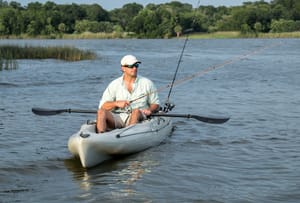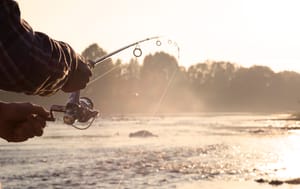When it comes to kayak fishing, the size of your vessel can make a significant difference in your experience on the water. Many anglers often wonder, "Is a longer kayak better for fishing?" This article aims to provide a comprehensive look into the factors that make a longer kayak a suitable (or unsuitable) option for your fishing adventures.
Key Takeaways:
- Longer kayaks tend to offer better tracking and stability, which can be beneficial for fishing.
- The size of the kayak should be chosen based on the type of water you'll be fishing in and your storage and transport capabilities.
- Personal preference, fishing style, and physical ability play crucial roles in determining the ideal kayak length.
The Importance of Kayak Length in Fishing
When selecting a kayak for fishing, length is a critical factor to consider. Longer kayaks, typically ranging from 12 to 16 feet, are often praised for their ability to maintain a straight course, known as tracking. This is particularly useful when covering larger distances or when facing strong currents and winds. The improved tracking can help anglers reach their desired fishing spots more efficiently.
However, the benefits of a longer kayak are not just limited to tracking. These vessels also tend to have a higher weight capacity, which is essential for carrying fishing gear, coolers, and potentially large catches. The additional space can be a game-changer for anglers who prefer to have a variety of equipment on hand.
Maneuverability and Transport: The Flip Side
While longer kayaks have their advantages, they also come with certain drawbacks. Maneuverability is one such aspect where shorter kayaks often outshine their longer counterparts. In tight spaces, such as narrow inlets or densely vegetated areas, a shorter kayak's ability to turn quickly can be invaluable. This makes them particularly suitable for fishing in small ponds, creeks, or along the shoreline.
Transporting and storing a longer kayak can also pose challenges. Due to their size, these kayaks require more storage space and can be more difficult to carry to and from the water. For anglers with limited storage or who frequently fish in remote locations, a shorter kayak might be the more practical choice.
Stability and Comfort: A Balancing Act
Stability is a top priority for many kayak anglers, as it allows them to focus on fishing without worrying about capsizing. Longer kayaks often provide greater primary stability (the kayak's steadiness when it is upright) and secondary stability (the kayak's ability to remain stable when tilted on its side). This can be particularly beneficial when reeling in large fish or when fishing in choppy waters.
Comfort is another factor that can be influenced by the length of the kayak. Longer kayaks often have more room for comfortable seating and legroom, which can be crucial during long hours on the water. Additionally, they may offer more options for customizing the kayak with fishing accessories, such as rod holders, fish finders, and anchor systems.
Speed and Efficiency: Covering More Water
For anglers who like to explore large bodies of water or who want to quickly move from one fishing spot to another, speed is an important consideration. Longer kayaks generally have a higher top speed and better efficiency, meaning they require less effort to paddle over long distances. This can be a significant advantage when trying to cover a lot of water in search of the perfect fishing spot.
However, the increased speed and efficiency come at the cost of increased weight. Longer kayaks are typically heavier, which can make them more challenging to handle both in and out of the water. This is an important consideration for those who fish alone or who may have physical limitations.
Personal Preference and Fishing Style
Ultimately, the decision of whether a longer kayak is better for fishing comes down to personal preference and fishing style. Some anglers prefer the agility and ease of transport of a shorter kayak, while others value the tracking, stability, and speed of a longer model. It's essential to consider your specific needs, the type of water you'll be fishing in, and your physical capabilities when making your choice.
For example, if you primarily fish in calm lakes and are looking for a kayak that can carry a lot of gear, a longer kayak might be the best option. On the other hand, if you enjoy fishing in small rivers or streams and prioritize ease of maneuverability, a shorter kayak could be more suitable.
Summary
In answering the question, "Is a longer kayak better for fishing?" it's clear that there is no one-size-fits-all answer. The ideal kayak length for fishing depends on various factors, including the type of water you'll be fishing in, your storage and transport capabilities, and your personal preferences. Longer kayaks offer better tracking, stability, and speed, which can be advantageous for certain fishing conditions. However, they can also be less maneuverable and more challenging to transport. It's important to weigh these pros and cons against your individual needs and fishing style to determine the best kayak for your angling adventures. Unlock your next great catch with our 2024 Top 9 Fishing Kayaks – the ultimate selection for anglers seeking adventure!
FAQ Section
Can a longer kayak handle rougher waters better than a shorter one?
Yes, generally speaking, longer kayaks tend to handle rough waters better due to their improved tracking and stability. They are less prone to being tossed around by waves and can provide a smoother ride.
Is it harder to paddle a longer kayak?
While longer kayaks may be heavier and require more effort to get moving, they are typically more efficient once at cruising speed. This means they can cover longer distances with less effort overall, despite potentially being more challenging to paddle initially
Should beginners choose a longer kayak for fishing?
Beginners should consider their physical ability, where they plan to fish, and their transport and storage options. A longer kayak might offer more stability and ease of paddling in a straight line, which can be beneficial for beginners. However, they should also be aware of the potential challenges in maneuverability and transportation.



